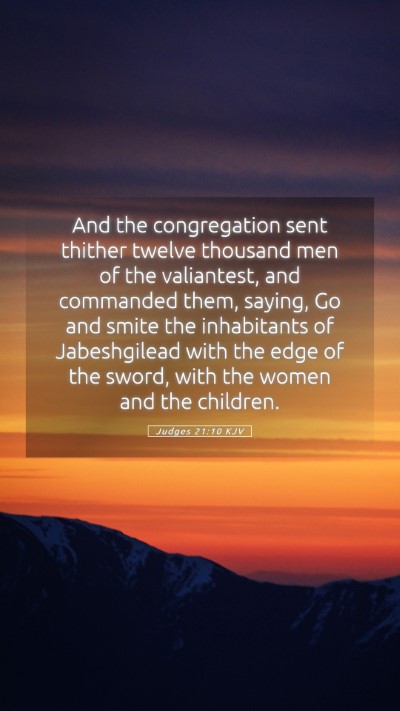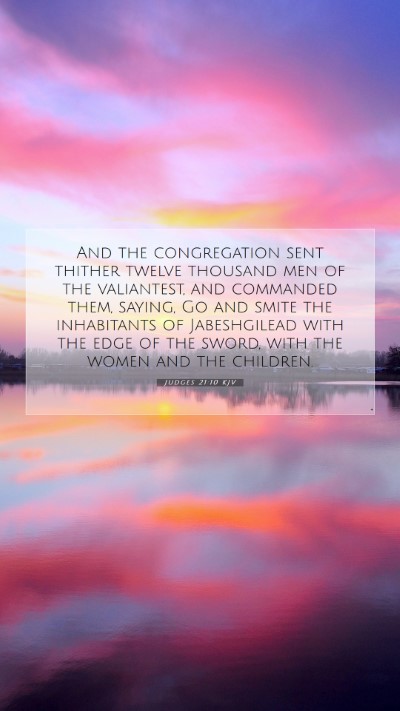Bible Verse Meaning of Judges 21:10
Judges 21:10 states: "So the congregation sent there twelve thousand men of the valiant, and commanded them, saying, Go and smite the inhabitants of Jabesh-gilead with the edge of the sword; with the women and the children." This verse reflects a difficult moment in Israel's history, illustrating themes of loyalty, the consequences of sin, and God's overarching justice. The following insights provide a deeper understanding of this text.
Historical Context
The context for Judges 21 includes the final events of the Book of Judges, a time marked by moral and social chaos in Israel. The Israelites were struggling with internal divisions and moral failures, leading to violent acts against their own people. This passage specifically addresses the aftermath of a civil strife and the consequences of a vow made by the Israelites.
Commentary Insights
-
Matthew Henry:
Henry emphasizes the grave nature of the Israelites' response to the sin committed by the tribe of Benjamin. He remarks on the severity of the command issued to destroy Jabesh-gilead due to their non-participation in the battle against Benjamin, showing how extreme measures were enacted in the face of perceived wrongdoing.
-
Albert Barnes:
Barnes points out the tragic irony of the situation, where Israelites sought to punish others for their lack of support in an internal conflict. He highlights how this act of retribution speaks to the breakdown of communal relationships and the tragic consequences of war.
-
Adam Clarke:
Clarke interprets this verse by examining the moral decline characterized by such violent actions among the Israelites. He discusses the implications of blind allegiance and the weight of vows, urging readers to understand the consequences of straying from God’s intended order.
Thematic Elements
This verse carries multiple thematic elements central to understanding Scripture:
- Divine Justice: The destruction of Jabesh-gilead serves as a grim illustration of justice, albeit misguided, reflecting the people’s interpretation of divine mandates.
- Loyalty and Betrayal: The concept of loyalty is examined here, revealing the dread of betrayal among tribes of Israel and the drastic measures taken in the name of unity.
- The Consequences of Violence: This act of violence symbolizes the cycle of sin and the inevitable consequences that lead to further bloodshed, seen repeatedly throughout the Book of Judges.
Application of This Verse
Understanding this verse requires a careful application to contemporary life. It reminds readers of the importance of communal ties and the need for reconciliation rather than retribution. In online Bible study groups, this passage can spark discussions on how to interpret God's justice in light of modern conflicts, particularly regarding the moral duties of communities to one another.
Additional Cross References
- Judges 19: The events leading up to the conflict with Benjamin.
- 1 Samuel 11:1-11: The story of Saul and Jabesh-gilead, providing further context to this location.
- Genesis 34: The story of Dinah, reflecting themes of revenge and the consequences of violence.
In-Depth Bible Verse Analysis
In-depth analysis reveals that Judges 21:10 serves as a cautionary tale about the perils of zeal without true justice and compassion. It showcases how communities can become embroiled in sins that lead to their own destruction if not guided by divine principles. For those exploring the meaning of Bible verses, this passage encourages the reader to seek understanding rather than jump to conclusions from surface-level interpretations.
Conclusion
In summary, Judges 21:10 is not just a historical account but a profound moment that invites readers into a deeper examination of loyalty, justice, and the repercussions of strife. For anyone involved in Bible study lessons or seeking Bible verse explanations, this passage offers rich material for understanding the complexity of human actions in light of divine expectations.


